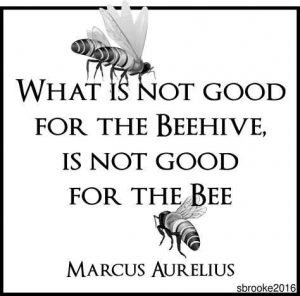Power Of Ideas Throughout History – Deep Thoughts on the ‘WHY?’ of the Human Condition
The Power Of Ideas
Over the course of history, great thought leaders have taken a moment to lay out their ideas. Ideas have changed the world. From Adam Smith and the birth of capitalism to Lenin and the birth of communism, the power of ideas has improved societies and or plunged millions of lives into pain, strife or death.
This blog post is an outline of the thinkers and philosophers that have spoken to me. I tend to align with the Stoic thinkers that have a belief that we are here to serve and sometimes the struggle makes us stronger. From Robert Greenleaf to Marcus Aurelius to Aristotle’s ‘Golden Mean’ to Rudyard Kipling’s ‘If’ poem, to Jesus, these great ideas have shaped Western culture and my life.
I try to chronical the big thinkers that I can identify with, and share a summary of their life’s work and impact on society.
In the end, you can tie up my philosophical beliefs from the major thinkers that I chronical below. If you don’t want to read and listen to all the different topics, just watch the reading of Rudyard Kipling’s poem – IF – and you’ll know where I stand;
Aristotle – Golden Mean
Moral behavior is the mean between two extremes – at one end is excess, at the other deficiency. Find a moderate position between those two extremes, and you will be acting morally. If you think about it, Aristotle was thinking about what it means to be a human almost 2000 years ago. Plato, Confucious, Aristotle all lived within 100 years of each other. What was going on during that period whereby people had to time to create some of the biggest thoughts of all times? My theory is that in times when things are good, people have time to move from ‘how do we eat today’ to why are we here. Other times in history bare out this theory. The Dark Ages that lead to the Rennaissance is one of the times that comes to mind.
Aristotle, and most of the big thinkers I’m drawn to try to define the role of virtues and ethics and how they lead to happiness.
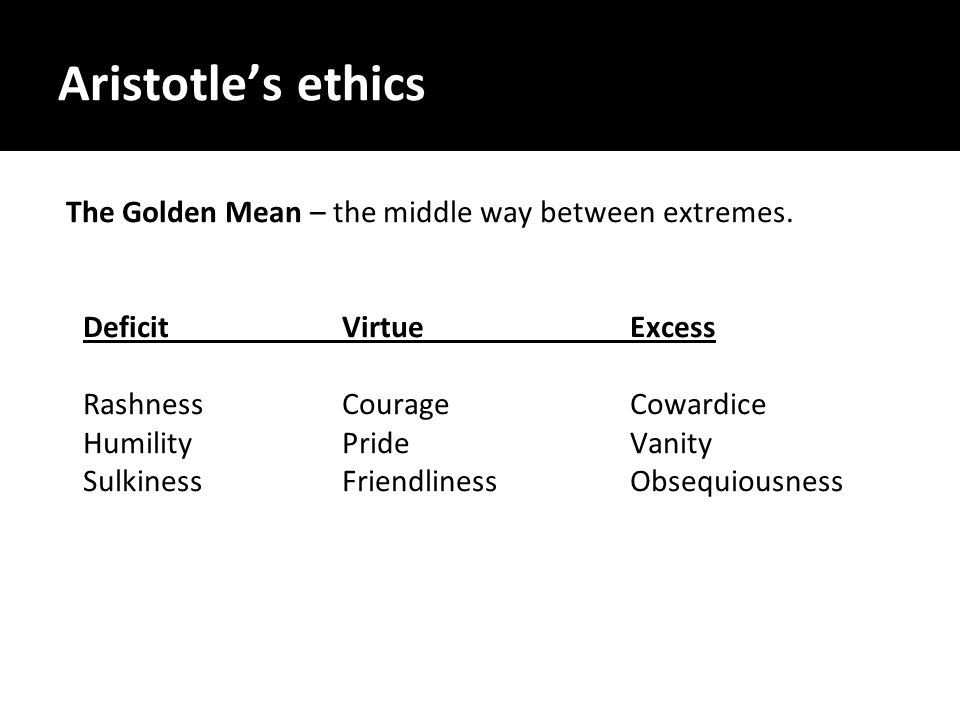
In a nutshell…..this is Aristotle
Marcus Aurelius – Defining Stoic Philosophy:
I’m reading through the mediations of Marcus Aurelius. What I’ve learned is that after 2000 years, men and countries are facing the same issues today as they did several thousands of years ago. General Mattis’ interview a the Hoover Institute puts it all in perspective. (HERE). Aurelius ruled Rome after Julius Ceaser, which I didn’t know, and during early Christianity. He came to power in 160 A.D. at the age of 39. He was groomed and trained from birth to rule. He believed in the Stoic Philosophers which was a 450-year-old line of philosophy that was founded by Zeon and honed by Seneca and Epicurious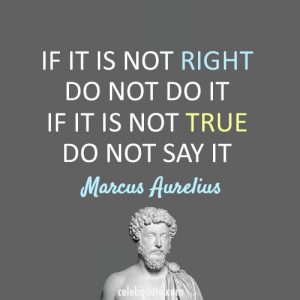
Way before Marcus, around 380 B.C., Plato wrote of an idea in which the greatest possible form of government is “one in which philosophers rule”. Marcus would eventually become the embodiment of Plato’s idea.
He demanded of himself 3 things:
- Noble action
- Good thought
- Strong character
The above Stoic traits defined Marcus Aurelius and led him to become the beloved and successful Emperor that he is still known as today.
The Stoics impacted history! In The Theory of Moral Sentiments, Smith referred to Marcus Aurelius as “the mild, the humane, the benevolent Antoninus,” demonstrating his deep admiration for the Stoic emperor. Marcus Aurelius influenced Adam Smith in three main areas: the idea of an inner conscience; the importance of self-control; and in his famous analogy of the “Invisible Hand.”
Both Marcus Aurelius and Adam Smith believed that the key to understanding morality was through self-scrutiny and sympathy for others.
Marcus Aurelius wrote Meditations in the form of a self-reflective dialogue with his inner self. He thought that moral conviction lay within “the very god that is seated in you, bringing your impulses under its control, scrutinizing your thoughts.’’ He interchangeably referred to this inner god as the soul or the helmsman and believed that it is a voice within you that attempts to sway you from immoral doings; we now call this a conscience.
Similarly, Smith emphasized the role of people’s innermost thoughts. A key aspect of Smith’s moral philosophy in The Theory of Moral Sentiments is the impartial spectator. Smith theorized that morality could be understood through the medium of sympathy. He thought that before people acted they ought to look for the approval of an impartial spectator.
“But though man has… been rendered the immediate judge of mankind, he has been rendered so only in the first instance; and an appeal lies from his sentence to a much higher tribunal, to the tribunal of their own consciences, to that of the supposed impartial and well-informed spectator, to that of the man within the breast, the great judge and arbiter of their conduct.”
The Importance Of Self-Control
The Stoics listed four “cardinal virtues” — wisdom, justice, courage, and temperance — for which they held great reverence. These were believed to be expressions and manifestations of a single indivisible virtue. Smith used slightly different names, but he endorsed the same set of virtues and the idea that they were all facets of one indivisible virtue.
Smith and Aurelius had a mutual appreciation for the virtue of self-control. They both believed in an impartial, self-scrutinizing conscience that guided morality: while Aurelius called it the God Within, Smith called it the Impartial Spectator.
Marcus Aurelius said, “You have power over your mind — not outside events. Realize this, and you will find strength.”The primacy of self-control is intrinsic to the Stoic philosophy. In a similar vein of thought, Smith writes that “self-command is not only itself a great virtue, but from all other virtues seem to derive their principal lustre.” This respect for self-control was encouraged and cultivated by Smith’s Impartial Spectator and Marcus Aurelius’ Inner God.
Marcus reframed his mindset to…..
- “I’m going to do my best everyday, my effort is always in my control”
- “If I meet any failure, I’ll know I gave it all I had and get better from it”
- “I will make mistakes. I am just a human, as was every emperor before me”
The First Reading of Marcus Aurelius (AoM)
1. Every Man Has a Primary Battle
Marcus Aurelius was a warrior, emperor, father, and husband. As a child, he lost his father when he was just a few years old, and as was common practice for aristocratic families of that era, Marcus was raised largely by mentors, nurses (nannies), and grandparents. When Aurelius became a father himself, he endured the deaths of eight children. All of that leads to the main themes that can be found in Meditations. You’ll see the same topics come up again and again and again.
Why does Aurelius write so much about death? Because he was surrounded by it — his family, his soldiers, his friends. Why does he write so much about not letting other people’s bad actions and attitudes affect you? As an emperor, he was dealing with greedy politicians day in and day out, as well as naysaying citizens. His Stoicism was a remarkably practical philosophy centered on simply surviving and staying sane in his world.
2. Every Man Should Take Lessons from Everyone Around Him
Our modern culture, however, has forgotten this ancient lesson. A moral failing by a modern business person, celebrity, politician, or even a company sparks internet outrage and calls for boycotts. Behaviors of historical figures now judged to be offensive, even if common to the time in which the men lived, are enough to write off all of their other admirable virtues and worthy accomplishments.
We don’t write ourselves off despite our flaws. Likewise, the wisest of men know that every person is a mosaic of virtue and vice, and that wisdom can be found in everyone, if only you’re willing to look.
3. Fate Plays a Role in Every Man’s Life — You Can Either Fight It or Accept It
“To the gods I am indebted for having good grandfathers, good parents, a good sister, good teachers, good associates, good kinsmen and friends, nearly everything good.”
“For all these [blessings in my life] require the help of the gods and fortune.”
best 25+ marcus aurelius quotes ideas only on pinterest | another on Marcus Aurelius Quotes Happiness – Broxtern Wallpaper and Pictures Collection
4. A Man is Not to Be Consumed by the Actions and Attitudes of Others
“When you wake up in the morning, tell yourself: The people I deal with today will be meddling, ungrateful, arrogant, dishonest, jealous and surly. . . . none of them can hurt me.”
“Don’t waste the rest of your time here worrying about other people . . . It will keep you from doing anything useful.”
5. Strenuous Action is the Answer
“When thou hast trouble in getting up, say to thyself: I awake to do the work of a man; why then should I grieve for having to do the things for which I was sent into the world? Was I born to remain warmly in bed under my covers? But it is so pleasant. Wert thou born for pleasure, then? Was it not for action, for work?”
“On the occasion of every act ask yourself . . . Will I regret it?”
“Why were you born? For pleasure? See if that answer will stand up to questioning.”
6. A Man Should Think, Do, and Be Good
As Aurelius advises, “inquire of yourself as soon as you wake from sleep.” Start every morning by getting in a mindset where you’re prepared to look for opportunities to serve and be useful. Benjamin Franklin practiced this, asking himself every morning “What good shall I do this day?” Then, at the end of the day, review your actions and inquire of yourself, as he did, “What good have I done today?” By bookending your day with a meditation on goodness, you will orient your soul more and more towards virtue.
Make your art that of being good. Do not simply think on it or talk about it; do good.
Stoic Philosophy
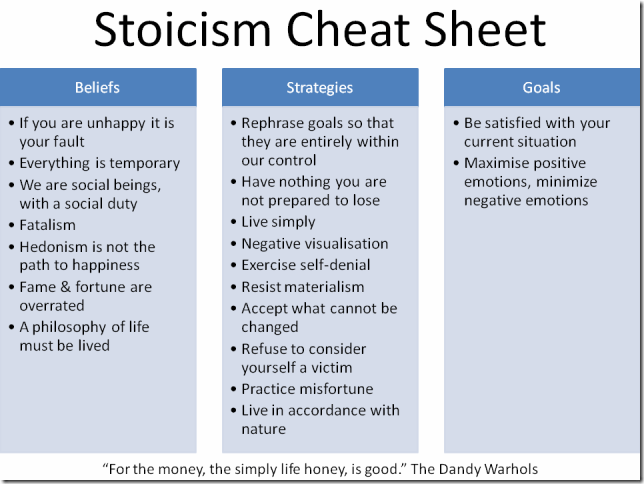
Marcus Aurelius comes from the Stoic line of philosophy. Started by Zeon around 335 BC, there is a few famous practitioners leading up to Aurelius’ time in 165 AD. Here’s some of the quotes that speak to me from three of the better know Stoics.
These will give you a sense of what their philosophy is all about.
| Marcus Aurelius |
| “How ridiculous and how strange to be surprised at anything that happens in life!” |
| Very little is needed for a happy life, it is within yourself; in your thinking |
| You have power over your mind, not outside events. Realize this and you shall have strength |
| Today I shall be meeting with interference, ingratitude, insolence, disloyalty, ill-will, and selfishness – all of them due to the offenders’ ignorance of what is good or evil.” |
| Waste no more time arguing what a good man should be, be one. |
| “Man is disturbed not by things, but by the views he takes of them.” |
| Each day provides it’s own gifts |
| “Everything, a horse, a vine, is created for some duty. Man’s true delight is to do the things he was made for.” |
| The art of living is more like wrestling than dancing |
| Do every act in your life, as if it were your last |
| The first step: Don’t be anxious. Nature controls it all. |
| Today I escaped anxiety. Or no, I discarded it, because it was within me, in my own perceptions – not outside. |
| The best answer to anger is silence. |
| The more we value things outside our control, the less control we have. |
| You’re subject to sorrow, fear, jealousy, anger and inconsistency. That’s the real reason you should admit that you are not wise. |
| A man when he has done a good act, does not call out for others to come and see, but he goes on to another act, as a vine goes on to produce again the grapes in season. |
| Receive without pride, let go without attachment. |
| Receive wealth or prosperity without arrogance; and be ready to let it go. |
| Let not your mind run on what you lack as much as on what you have already. |
| If it is not right do not do it; if it is not true do not say it. |
| So I look for the best and am prepared for the opposite. |
| When you arise in the morning, think of what a precious privilege it is to be alive – to breathe, to think, to enjoy, to love. |
| It is not death that a man should fear, but he should fear never beginning to live. |
| Dwell on the beauty of life. Watch the stars, and see yourself running with them. |
| No man can escape his destiny, the next inquiry being how he may best live the time that he has to live. |
Don’t set your mind on things you don’t possess as if they were yours, but count the blessings you actually possess and think how much you would desire them if they weren’t already yours. – Marcus Aurelius, Meditations, 7.27
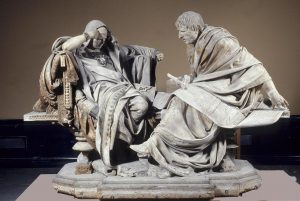
Seneca advises Emperor Nero. Nero and Caligula were two of the harsh rulers of the Roman Empire that went down in history on how not to lead.
| Seneca |
| It is a rough road that leads to the height of greatness |
| Wherever there is a human being there is an opportunity for kindness |
| Luck is preparation meeting opportunity |
| The most powerful is he who has himself in his own power |
| The greatest remedy for anger is delay |
| The first step in a persons salvation is knowing his sin |
| The less we deserve good fortune, the more we hope for it. |
| The bravest sight in the world is to see a great man struggling with adversity |
| For many men, the acquisition of wealth doesn’t end their troubles, it only changes them |
| The mind that is anxious about the future in miserable |
| You learn to know a pilot in a storm |
| Punishment to some, to some a gift, to many a favor |
| The heart is great, which shows moderation in prosperity |
| A man is as miserable as he thinks he is |
| Do everything, as in the eye of another |
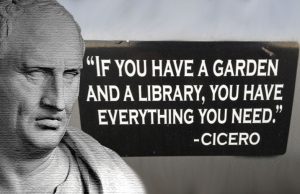 |
| Cicero (borrowed from and aligned with Stoic philosophy) |
| Gratitude is not only the greatest virtue but the parent of all others |
| Silence is one of the great arts of conversation |
| If you have a garden and a library you have everything you need |
| The higher we are placed, the more humbly we should walk |
| The wise are instructed by reason, average minds by experience, the stupid by necessity and the brute by instinct |
| Never go to excess but let moderation be your guide |
| Before beginning, plan carefully |
| The greater the difficulty the greater the glory |
| A man of courage is also full of faith |
| Rashness belongs to youth, prudence to old age |
| I never admire another’s fortune, so much that I become dissatisfied with mine |
| Honor is the reward of virtue |
| Ability without honor is useless |
| We forget our pleasures, we remember our struggles |
Morgan Freeman recites ‘Invictus’
Benjamin Franklin
We’ve all learned about Ben Franklin and the kite with the key, but if you put Franklin’s life as a total in perspective you start to see how truly amazing he was. First, he was an inventor and entrepreneur. A statesman and community leader. The part that jumps at me was his impact on Revolutionary America. If you look at history, Revolutions are lead and sparked by the young. Ben was 70, clearly the odd man out. Sam Adams was 53, George Washington 45, John Adams 40, William Penn 35, Thomas Jefferson 33 and Alexander Hamilton was 21. When Ben joined the revolutionary cause to declare independence from the most powerful nation on earth, England, he had a lot to lose. The lending of his name to the effort was a huge turning point in getting the colonies on board to form a new country.
FEE – Franklin, more than anybody, linked the emerging international movements for liberty. James Madison recalled that he never passed half an hour in his company without hearing some observation or anecdote worth remembering. Franklin dined with Wealth of Nations author Adam Smith. The Scottish philosopher David Hume told Franklin: America has sent us many good things, Gold, Silver, Sugar, Tobacco, Indigo . . . . But you are the first Philosopher, and indeed the first Great Man of Letters for whom we are beholden. Edmund Burke, who had opposed Britain’s war against America, called Franklin the friend of mankind. When the French wit Voltaire met William Temple Franklin, he quipped: God and Liberty! It is the only benediction which can be given to the grandson of Franklin. Laissez-faire economist Anne Robert Jacques Turgot remarked that Franklin snatched the lightning from heaven and the scepter from tyrants.
Franklin was a late-blooming radical. During his 30s, he brokered the sale of some slaves as a sideline for his general store. He and his wife owned two slaves. In 1758, when he was 52, he suggested establishing Philadelphia’s first school for blacks. He abandoned his support for the British Empire and committed himself to the American Revolution when he was 70. Philadelphia Quakers had launched the abolitionist movement by organizing the Pennsylvania Society for Promoting the Abolition of Slavery (1775), but its activities ceased during the Revolution; this pioneering society revived in 1787 when Franklin became its president, at 81. Two years later he voiced his support for the ideals of the French Revolution.
Franklin was famous for his charm and tact, which enabled him to get the most out of people, but he had detractors. For instance, John Adams complained that I could never obtain the favour of his Company in a Morning before Breakfast which would have been the most convenient time to read over the Letters and papers. . . . Mr. Franklin kept a horn book always in his Pockett in which he minuted all his invitations to dinner, and Mr. [Arthur] Lee said it was the only thing in which he was punctual . . . and after that went sometimes to the Play, sometimes to the Philosophers but most commonly to visit those Ladies. . . . John Dickinson, head of Pennsylvania’s delegation to Congress, hated Franklin so much that he refused to install a lightning rod on his Philadelphia mansion—and it was struck by lightning.
Practical Wisdom
A person will have all the moral virtues and Sophia, or a grasp of eternal truths. Have you ever met someone that always seems to have the right answers, or more importantly knows how to ask the right questions at the right moments? These people are sought out when you need advice. They seem to know how to read emotions better than others. A person with practical wisdom knows the rules but knows when and how to bend them when it’s the right thing to do. The person who has better practical wisdom tends to anticipate the future.
Practical wisdom….. I don’t know how to define it, but I know it when is see it.
Hume
Adam Smith
John Locke
Jonathan Haidt
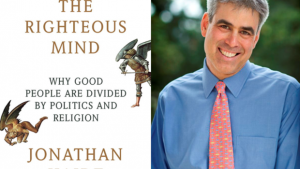 Jonathan Haidt is looking closely at society and how things evolve. Jonathan David Haidt is an American social psychologist and Professor of Ethical Leadership at New York University’s Stern School of Business. His academic specialization is the psychology of morality and the moral emotions. Jonathan’s book, The Righteous Mind, is a fascinating read on the why’s, how’s and what’s of human morality. Morality you ask? How boring! Well at the root of all things on earth, at the intersection of all events in history, at the rise and fall of all civilizations, in your daily interactions with your family or at work, morality, and how we as people process our world is the root of everything.
Jonathan Haidt is looking closely at society and how things evolve. Jonathan David Haidt is an American social psychologist and Professor of Ethical Leadership at New York University’s Stern School of Business. His academic specialization is the psychology of morality and the moral emotions. Jonathan’s book, The Righteous Mind, is a fascinating read on the why’s, how’s and what’s of human morality. Morality you ask? How boring! Well at the root of all things on earth, at the intersection of all events in history, at the rise and fall of all civilizations, in your daily interactions with your family or at work, morality, and how we as people process our world is the root of everything.
Haidt weaves a theory that is well argued that there are 6 pillars which create the human moral compass. He looks anthropologically to prove the point that humans are social beings, we use our moral tools to get along and thrive in groups.
The Five Foundations
1. The Care/Harm Foundation
This foundation makes us sensitive to signs of suffering and need. In order to maximize care and minimize harm, we enact laws that protect the vulnerable. We punish people who are cruel and we care for those in suffering.
2. The Fairness/Cheating Foundation
This foundation leads us to seek out people who will be good collaborators in whatever project we are pursuing. It also leads us to punish people who cheat the system. People on both the right and the left believe in fairness, but they apply this foundation in different ways. Haidt explains:
“On the left, fairness often implies equality, but on the right it means proportionality – people should be rewarded in proportion to what they contribute, even if that guarantees unequal outcomes” (161).
3. The Loyalty/Betrayal Foundation
All of us, whether on the right or left, are “tribal” in some sense. We love the people on our team, and loyalty makes our team more powerful and less susceptible to our failure. Likewise, we have a corresponding hatred for traitors. Those who betray our “team” for the other side are worse than those who were already on the other side.
Though Haidt sees both left and right as being tribal, he recognizes “the left tends toward universalism and away from nationalism, so it often has trouble connecting to voters who rely on the Loyalty foundation” (164).
4. The Authority/Subversion Foundation
Authority plays a role in our moral considerations because it protects order and fends off chaos. Haidt explains:
“Everyone has a stake in supporting the existing order and in holding people accountable for fulfilling the obligations of their station” (168).
5. The Sanctity/Degradation Foundation
No matter the era, humans have always considered certain things “untouchable” for being dirty and polluted. The flipside is that we want to protect whatever is hallowed and sacred, whether objects, ideals, or institutions.
People on the right talk about the sanctity of life and marriage. People on the left may mock purity rings.
6. The Liberty/Oppression Foundation
This foundation builds on Authority/Subversion because we all recognize there is such a thing as legitimate authority, but we don’t want authoritarians crossing the line into tyranny. Both the left and the right hate oppression and desire liberty, but for different reasons.
The left wants liberty for the underdogs and victims (coinciding with their emphasis on Fairness/Cheating). The right wants liberty from government intrusion.
He digs into great thinkers like Plato and Hume who intuitively put forth arguments as to who’s in control in our minds, the urge driven ego or the rational moral compass. Haidt, like Gladwell and Duckworth (below), uses research studies and cross discipline analysis to prove, probably the most important point of all, which is ‘what makes people tick?’ His use of analogies like the real motivations in people are the large elephant and the part that controls our impulses and urges is the nimble rider help illustrate that to changes someone’s mind and belief system, you can’t appeal to the rider, you must get the elephant to WANT to change. Haidt references my favorite book of all time, How To Win Friends and Influence People by Dale Carnegie. The Righteous Mind is a great read if you want to get to the root of the ‘why’ of human nature.
Haidt sums up his morality as an evolutionary tool theory:
Koch Brothers
Freakonomics – (on history and philosophy of what motivates man)
 The power of money and ideas – This interview explains Charles Koch’s move from business to the business of funding of ideas. Listen to his move from scholarships to professors to think tanks to state and national politics. This story is about the power of ideas to change the world. Q: “Why do you care so personally about shaping the history of mankind?” About 24:00 in, Koch explains his motivations.
The power of money and ideas – This interview explains Charles Koch’s move from business to the business of funding of ideas. Listen to his move from scholarships to professors to think tanks to state and national politics. This story is about the power of ideas to change the world. Q: “Why do you care so personally about shaping the history of mankind?” About 24:00 in, Koch explains his motivations.
Part 2
Charles Koch argues that the biggest threats to America these days are special interests, cronyism, and corporate welfare. Which may seem strange if you think of a corporate CEO, like Koch, as a beneficiary of those things. He also argues that our political system has turned into a dumpster fire, with both parties guilty of rent-seeking and putting their thumbs on whatever scales they can find. Which may also strike you as strange, if you consider that what a political network like the Koch Brothers’ network does is — well, puts its thumb on the scale. Because he primarily funds Republicans, and because so much of that funding is “dark,” anonymous money, he is seen by most Democrats as something close to the devil — even though some of his positions, as you’ll hear today, align quite snugly with traditional liberal positions.
My overall impression from speaking with him? Charles Koch believes he’s fighting the good fight based on proven principles — and that the rest of America has been going mad, bit by bit.
On Business:
EntreLeadership (on business)- HERE
St. Agustine
‘Better than to have loved and lost, than never to have loved before’

Jordan B Peterson – 12 Rules for Life –
Here’s a few of my favorite Art of Manliness episodes:
Tyler Cowen, one of my favorite economists. The Complacent Class
Honor, Courage and Themos, Plato’s Ideas of Manliness – Angela Hobbs
Make Your Bed Change The World – Navy Seal – Admiral William McCraven – First saw McCraven at the UT Commencement Address
Ancient Honor – Dr. Barton
What Ancient Greeks and Romans Thought About Manliness – Ted Landen
The Road to Character – David Brooks – I bought the book after this interview.
The Untold Story of Jimmy Stewart in WWII – Robert Matzen – A man at the top of the world …… turns to service. Great story!
The Case for Blue Collar Work – Mike Rowe – HERE
Ben Sasse – on Society and Culture – HERE
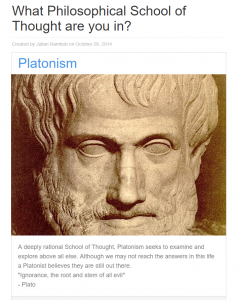
Some thought leaders that I really have been intrigued by are Malcolm Gladwell, Angela Duckworth and Tim Ferriss. They’ve made observations and studies of people and society on a micro and macro level. Each of these authors and thinkers has a body of work on how to destruct what makes some people succeed while other people, who seem to have it all, fail. Here are a few of my favorite lectures by these people:
https://youtu.be/iNiJEsb1PMw
HERE with Pastor Rick Warren.
Angela Duckworth- GRIT and Perseverance! Ever wonder why friends or family members that have it all, money, looks, smarts and opportunity yet struggle at life? The missing ingredient needed is GRIT. Duckworth does a deep analysis of the science and psychology behind success. Get the book and devour it. Freakonomics covered a super bold project that Duckworth is proposing, check out the interview….Could Solving This One Problem Solve All Others?
Tim Ferriss and his first book, 4 Hour Work Week, started out his journey on figuring out the hacks that make great people great. From sports to money to cooking to military figures, Tim interviews and dissects the best of the best. Start with Tools For Titans and subscribe to his podcast.
THIS article from Inside Business is a great starting point to learn all things, Tim. Here’s what jumped out at me:
1. There are two parts to self-improvement
Oftentimes we see self-improvement merely as goal achievement. However, Tim realized that achievement is only 50% of it. He says, “The other 50% is gratitude and appreciating what you already have, not focusing solely on future accomplishments.” There are so many highly successful people who are never satisfied with what they’ve accomplished and it’s unfortunate.
As Tim mentioned, “They’ve conquered every mountain, slayed every dragon and they’re still not happy”. Don’t be one of those people! If you want to have any sense of well-being, you have to show appreciation for what you already have.
2. Improve two areas of your life at a time
For those of us who are Type A personalities, we tend to be super ambitious and self-critical as we’re always trying to improve our lives. Over the last 10 years Tim realized that “too much optimizing can be self-destructive.” Like with many things in life, things in excess tend to take on the characteristics of their opposites. So in this case, the sole focus on self-improvement can be misguided and can lead to depression and anxiety.
6. Focus on developing skills and relationships
When making important decisions and capping the downside, potential risks or mistakes, Tim focuses on two things: skills and relationships. The question he asks himself is, “Even if this fails, are there skills and relationships that I can develop that will carry over into other things?” Tim’s philosophy is that, “Failure isn’t failure if you can gain new skills and develop relationships for future advancement.”
7. It’s important to diversify your identity
When you’re passionate about your work, it’s easy to have everything vested in your business which can serve you well in most cases. However, Tim says that “100% dedication can lead to a disaster in the sense that you have all of your psychological eggs in one basket.”
10. Fame, power, money and alcohol just make you more of who you already are
Tim knows a lot of successful people who are worth hundreds of millions of dollars. One thing he’s learned is that fame, power, money, and alcohol just make you more of who you already are.
He explained, “So if you’re neurotic, add 100 million to that, you’ll be super neurotic!” If you’re generous, add 100 million to that, you’ll be even more generous. Essentially your characteristic just get exaggerated when you add those things in life. So it’s important that you work on who you want to be before you get those things.
Here’s a long form interview with Tony Robbins and Tim Ferriss. I remember listening to Tony Robbins cassette tapes in college and graduated to his CD’s. To hear the two together is pretty cool.
Want to dig into Social Psychology? Start with Canadian, Dr. Jordon Peterson – HERE – He weighs in on safe spaces and political correctness. My favorite in #1…be grateful!
Talk Radio Guy Reflects – Sounds Familiar
I got to say that when the latest Krista Tippett podcast interview featuring Glenn Beck came on I immediately thought ….nope, can’t do it. After listening I have to say his journey and his summation of where we are as a country is a spot on. Like Beck, I spent years on the air in conservative talk radio. Day in and day out for 7 years I devoured every bit of news, followed the story of the day, spun, entertained and started to see patterns. Like Glenn, the intense journey of a daily radio show can really change a person. The very nature of talk radio is focusing on the negative. I started my media career at the election of Barack Obama. During his entire presidency, I had a ringside seat. About 6 years in, I started to see these major patterns that really started to paint a dark picture on the future of our society. I compiled the patterns and am in the process of putting the concepts into a book. The book intro is open to view on this blog – HERE. In this interview, Beck opens up, sees his role as fear mongering entertainer and the damage he’d done to the country. Like Beck, after the craft of interviewing is perfected, once you a covered the outrage of the day for the 1000th time after the ego has been built up and the adorations have been logged you start to look at your role as a thought leader. You start to realize that you are now part of the problem and ultimately part of the solution. I tuned out from Beck because to me he was entertainment and I’m hungry for knowledge and explanations. After this interview, his vulnerability and his realization of his mistakes came across loud and clear. Today I bought one of his recent books and I’m going to start listening again. His journey is my journey and I really really get where he’s coming from. Glenn Beck and Samantha Bee – HERE
This one spoke to me, I included the truths that I identify with but encourage you to read the entire article (HERE):
19 Great Truths My Grandmother Told Me on Her 90th Birthday
“I have seen and touched and danced and sang and climbed and loved and meditated on a lifetime spent living honestly. Should it all end tonight, I can positively say there would be no regrets. I feel fortunate to have walked 90 years in my shoes. I am truly lucky. I really have lived 1,000 times over.”
- There are thousands of people who live their entire lives on the default settings, never realizing they can customize everything. – Don’t settle for the default settings in life. Find your loves, your talents, your passions, and embrace them. Don’t hide behind other people’s decisions. Don’t let others tell you what you want. Design YOUR journey every step of the way! The life you create from doing something that moves you is far better than the life you get from sitting around wishing you were doing it.
- The right journey is the ultimate destination. – The most prolific and beneficial experience in life is not in actually achieving something you want, but in seeking it. It’s the journey towards an endless horizon that matters—goals and dreams that move forward with you as you chase them. It’s all about meaningful pursuits—the “moving”—and what you learn along the way. Truly, the most important reason for moving from one place to another is to see what’s in between. In between is where passions are realized, love is found, strength is gained, and priceless life-long memories are made.
- The willingness to do hard things opens great windows of opportunity. – One of the most important abilities you can develop in life is the willingness to accept and grow through times of difficulty and discomfort. Because the best things are often hard to come by, at least initially. And if you shy away from difficulty and discomfort, you’ll miss out on them entirely. Mastering a new skill is hard. Building a business is hard. Writing a book is hard. A marriage is hard. Parenting is hard. Staying healthy is hard. But all are amazing and worth every bit of effort you can muster. Realize this now. If you get good at doing hard things, you can do almost anything you put your mind to.
- No one wins a game of chess, or the game of life, by only moving forward. – Sometimes you have to move backward to put yourself in a position to win. Because sometimes, when it feels like you’re running into one dead end after another, it’s actually a sign that you’re not on the right path. Maybe you were meant to hang a left back when you took a right, and that’s perfectly fine. Life gradually teaches us that U-turns are allowed. So turn around when you must! There’s a big difference between giving up and starting over in the right direction.
- Our character is often most evident at our highs and lows. – Be humble at the mountaintops, be strong in the valleys, and be faithful in between. And on particularly hard days when you feel that you can’t endure, remind yourself that your track record for getting through hard days is 100% so far.
- Life changes from moment to moment, and so can you. – When hard times hit there’s a tendency to extrapolate and assume the future holds more of the same. For some strange reason, this doesn’t happen as much when things are going well.
- You can fight and win the battles of today, only. – No matter what’s happening, you can resourcefully fight the battles of just one day. It’s only when you add the battles of those two mind-bending eternities, yesterday and tomorrow, that life gets overwhelmingly difficult and complicated.
- Solitude is important, too. – Speaking to someone can help, but in moderation. Sometimes the moments you feel lonely are the moments you may most need to be by yourself. This is one of life’s cruelest ironies. We need solitude because when we’re alone we’re detached from obligations, we don’t need to put on a show, and we can hear our own thoughts and feel what our intuition is telling us. And the truth is, throughout your life there will be times when the world gets real quiet and the only thing left is the beat of your own heart. So you’d better learn the sound of it, otherwise, you’ll never understand what it’s telling you.
- Beginning each day with love, grace and gratitude always feels better than the alternative.
- Most of the time you don’t need more to be happier—you need less. – When things aren’t adding up in your life, begin subtracting. Life gets a lot simpler and more enjoyable when you clear the emotional and physical clutter that makes it unnecessarily complicated. (Angel and I guide our readers through this process of simplifying and getting back to happy in our brand new book.)
- Who we choose to be around matters immensely. – Spend time with nice people who are smart, driven and likeminded.
- It’s during the toughest times of your life that you’ll get to see the true colors of the people who say they care about you. – Notice who sticks around and who doesn’t, and be grateful to those who leave you, for they have given you the room to grow in the space they abandoned, and the awareness to appreciate the people who loved you when you didn’t feel lovable.
- New opportunities are always out there waiting for you. – Nobody gets through life without losing someone they love, something they need, or something they thought was meant to be. But it is these very losses that make us stronger and eventually move us toward future opportunities. Embrace these opportunities.
A book review from University Bookman of the book by Fran O’Rourke Aristotelian Interpretations –
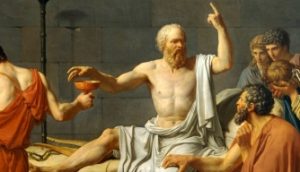 Aristotle on Why Things Are;
Aristotle on Why Things Are;
Aristotle is himself a liberal education. He is the one who best explains to us why we seek to know things “for their own sake,” why we need to know the order of things. No one, even to this day, works his way as carefully through the whole range of reality as carefully and clearly as does Aristotle. And when other thinkers come close, it is usually because they are themselves first readers of Aristotle. To read Aristotle is to begin to know how things are. And to know how and why things are is to be educated liberally.
Self Awareness – Morality – Self Destiny;
I was particularly struck by O’Rourke’s awareness that the drama of existence itself is what is played out in each of our human lives. The existence of millions and billions of human beings on this planet is not actualized in some collective form or ideal. It is actualized in each existing human being.
Though we exist as individual persons, because of our knowledge and our power to act on account of it, we are not deprived of the rest of the world.
Individual First, Fitting Into The World Second;
“We do not have simply a vague desire for the fact of being,” O’Rourke writes. “Our happiness derives from the awareness of our own life as good; each man’s existence is desirable for himself.… Self-awareness is a certainty; it is concomitant self-awareness of ourselves in our knowing the world and as agents within the world” (86). Though we exist as individual persons, because of our knowledge and our power to act on account of it, we are not deprived of the rest of the world. Through knowing, we can become what is not ourselves without changing what is not ourselves. This fact is basically why it is all right to be a single, relatively insignificant human being. We desire our own existence, but this existence opens out onto all that is wherein we self-actualize ourselves in terms of our chosen relation to the good that is there and that we come to know, to accept or reject.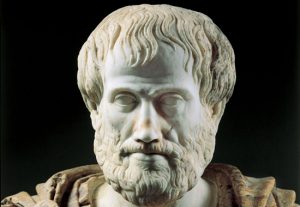
On Politics – The Pinnacle of Man
When politics has come to be what it ought to be, it turns us finally not to the practical life of this world but indirectly to the contemplative life, to our wonder about what it is all about and how to articulate what we can know about the highest things, even if, as Aristotle also said in the last book of the Ethics, it is small in comparison to other, more visible practical things. “There is ambivalence at the heart of wonder. It is not simply the absence of knowledge, but a knowledge that there is something beyond its reach. This finds its explanation in Aristotle’s distinction between what is intelligible in itself and what is evident to us” (32). We realize that we are limited beings with a power of mind that is capax omnium, capable of knowing all that is. Thus we must grant that “the intelligibility of the real far exceeds our understanding.” It is this realization that is no doubt the primary natural reason why something like a divine revelation might just be both possible and even actual.[7] It also explains the “restless hearts” that we so readily associate with Augustine.
Because We Have Minds – We Have Choices
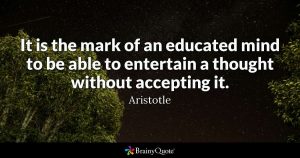 In conclusion, let me return to the two initial citations that are found at the beginning of these reflections. The first concerns the mind that is found in each member our kind. It is because we have minds that we can worry about, wonder about, what is out there, what is not ourselves. And we can not only pay attention to it, but we can see its diversity and its unities. But we know with our mind not only what is not ourselves, but also the possibility that we can change, reshape many things. We even suspect that we can and should use things that are just there through no contribution of our own. Indeed, it suggests that the uninhabited world was in fact meant to be inhabited. It was meant to provide a place for a being that knew and acted. In so doing, it revealed his soul.
In conclusion, let me return to the two initial citations that are found at the beginning of these reflections. The first concerns the mind that is found in each member our kind. It is because we have minds that we can worry about, wonder about, what is out there, what is not ourselves. And we can not only pay attention to it, but we can see its diversity and its unities. But we know with our mind not only what is not ourselves, but also the possibility that we can change, reshape many things. We even suspect that we can and should use things that are just there through no contribution of our own. Indeed, it suggests that the uninhabited world was in fact meant to be inhabited. It was meant to provide a place for a being that knew and acted. In so doing, it revealed his soul.

